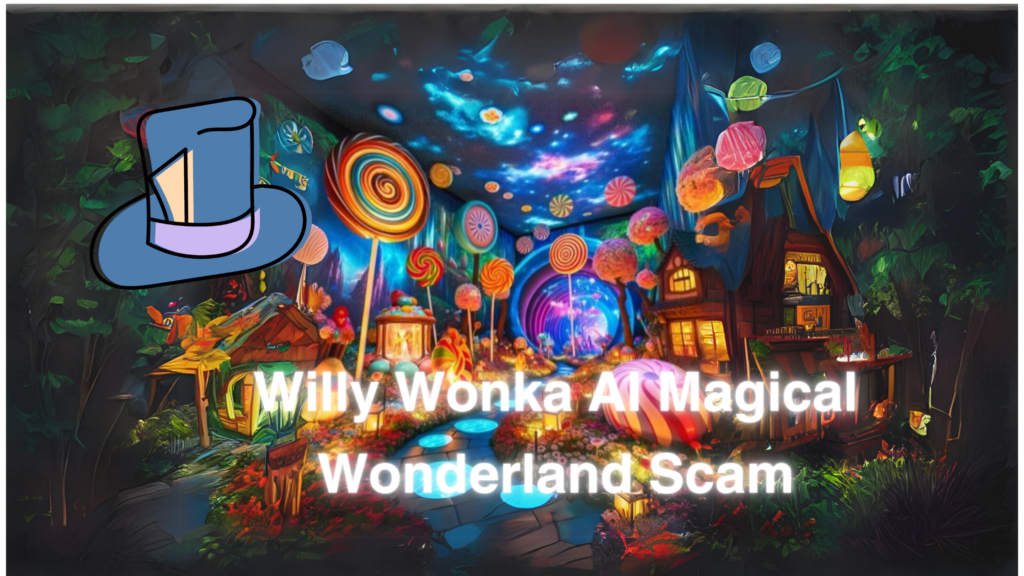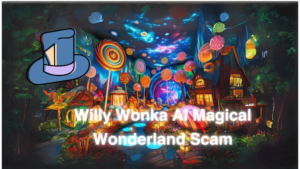The allure of stepping into a world of pure imagination, akin to the legendary Willy Wonka’s chocolate factory, captivates the hearts and minds of many. The prospect of indulging in a Willy Wonka-themed Magical Wonderland promised attendees an escape into a realm of whimsy and delight. The anticipation was palpable as people imagined themselves surrounded by towering lollipops, cascading chocolate fountains, and an array of fantastical confections.
However, the dream of experiencing such a fantastical adventure turned into a nightmare for attendees of the Glasgow Willy Wonka Experience.
What was supposed to be a journey into wonderland soon unraveled into a harsh reality that fell far short of expectations. The organizers, the House of Illuminati, had painted a vivid picture of enchantment and joy, enticing attendees with promises of an immersive experience like no other.
Yet, as attendees stepped through the doors of the venue, they were met with a scene that bore little resemblance to the magical world they had envisioned.
Instead of vibrant colors and whimsical decor, they found themselves in a dimly lit warehouse devoid of the charm and magic promised. The AI-generated Willy Wonka Themed Park they had been led to expect was nothing more than a disappointing facsimile, lacking the imagination and creativity that characterized the beloved tale.
As disappointment gave way to frustration, attendees began to voice their grievances, demanding answers and seeking recourse for the £35 admission fee they had paid.
The controversy behind the Willy Wonka AI scam quickly gained momentum, with fingers pointed at Billy Coull, the mastermind behind the House of Illuminati. Coull, known for his ventures into AI-assisted writing, had perhaps overestimated the capabilities of technology in recreating the magic of Willy Wonka’s world.
Amidst the uproar, uncertainty loomed over the possibility of refunds, leaving attendees in a state of limbo as they awaited resolution. The debacle became the subject of ridicule and mockery on social media platforms, with memes depicting the disappointment and disillusionment of those who had fallen victim to the scam.
The Willy Wonka AI Magical Wonderland Scam serves as a cautionary tale, reminding us of the pitfalls of chasing after extravagant promises without exercising due diligence.
It underscores the importance of transparency and honesty in event organization, urging attendees to approach seemingly too-good-to-be-true offerings with a healthy dose of skepticism. As the dust settles on this ill-fated venture, it leaves behind a bitter taste and a valuable lesson in its wake.
Willy Wonka’s Magical Wonderland
Attendees of the Glasgow Willy Wonka Experience had eagerly anticipated immersing themselves in a whimsical Willy Wonka-themed Magical Wonderland.
Envisioning a world reminiscent of the beloved chocolate factory, they looked forward to encountering larger-than-life lollipops, indulging in decadent treats, and dipping various delicacies into a flowing chocolate fountain. However, their hopes were dashed upon arrival as they realized that reality fell far short of the fantastic promises made by the event organizers.
Instead of stepping into a magical realm brimming with wonder and enchantment, attendees found themselves in a dreary warehouse devoid of the charm and magic they had anticipated. The discrepancy between expectation and reality left many feeling disappointed and disillusioned as they grappled with the realization that the Willy Wonka Themed Magical Wonderland they had imagined existed only in their dreams.
The decorations, if they could even be called that, appeared to be haphazardly placed, lacking the intricacy and attention to detail that one would expect from such an event. The absence of genuine creativity and imagination was palpable as attendees wandered through the lifeless landscape of the supposed wonderland.
It’s All AI-Generated Willy Wonka Themed Park
Upon entering the event venue, attendees were initially filled with anticipation, expecting to be transported into a whimsical Willy Wonka-themed magical wonderland. However, their excitement quickly turned to dismay as they realized that the entire spectacle was nothing more than an uninspired AI-generated Willy Wonka Themed Park.
Gone were the vibrant colors and intricate details they had imagined. Instead, they were greeted by a stark and sterile environment, lacking the charm and warmth that characterized the world of Willy Wonka. The decorations, if they could even be called that, appeared to be haphazardly placed, devoid of the creativity and attention to detail one would expect from a themed event.
It became evident to attendees that the entire experience had been crafted by artificial intelligence, with no human touch to be found. The lack of genuine creativity and imagination was striking as they wandered through the lifeless landscape of the supposed wonderland.
As they explored further, attendees realized that even the interactive elements of the park felt scripted and artificial. The so-called “magical” experiences were nothing more than pre-programmed sequences devoid of spontaneity or genuine surprise.
The disappointment and disillusionment among attendees were palpable as they came to terms with the fact that the magic they had hoped to experience was nothing more than a facade generated by algorithms and computer programs. The promise of a Willy Wonka-themed Magical Wonderland had been nothing but a cruel deception, leaving attendees feeling cheated and betrayed by the organizers.
Controversy behind Willy Wonka AI
The Controversy behind Willy Wonka AI erupted into a full-blown scandal as attendees of the Glasgow Willy Wonka Experience discovered the vast chasm between the event’s extravagant promises and the stark reality they encountered. Social media platforms buzzed with outrage as disappointed attendees shared their experiences, highlighting the discrepancies between what was advertised and what was delivered.
As the uproar intensified, individuals who had attended the event began to voice their grievances publicly, demanding answers and seeking refunds for the £35 admission fee they had paid. Many expressed feelings of betrayal, accusing the event organizers of false advertising and deceptive practices.
At the center of the controversy stood Billy Coull, the mastermind behind the House of Illuminati and the driving force behind the ill-fated event. Coull’s reputation as an author known for his collaboration with AI technology in writing only fueled speculation about the role of technology in the event’s failure.
Attendees questioned whether Coull’s reliance on AI had compromised the authenticity and creativity of the experience, ultimately leading to its downfall.
As the controversy unfolded, it sparked broader discussions about the ethical implications of using AI in event planning and marketing. Some argue that while AI technology can enhance efficiency and streamline processes, it should not come at the expense of human creativity and integrity.
Others raised concerns about the need for transparency and accountability in advertising and event organization, emphasizing the importance of accurately representing what attendees can expect.
In the midst of the controversy, the House of Illuminati attempted damage control, issuing statements promising refunds and addressing some of the concerns raised by attendees. However, skepticism lingered, with many questioning whether they would ever receive restitution for their disappointment.
The Controversy behind Willy Wonka AI served as a cautionary tale, highlighting the risks of prioritizing technological innovation over genuine human experience. It underscored the importance of transparency, honesty, and accountability in event planning, reminding both organizers and attendees alike of the need for integrity in all aspects of the event industry.
Behind Willy Wonka AI Scam
The Refund Rollercoaster:
Promises of Refunds:
In response to the widespread disappointment and demands for accountability, the House of Illuminati, spearheaded by Billy Coull, issued statements promising full refunds to attendees. Attendees were assured that their grievances would be addressed promptly and steps would be taken to rectify the situation.
Doubts and Uncertainty:
Despite the assurances from the organizers, skepticism ran rampant among attendees who questioned the sincerity of the promises. Many voiced concerns about the lack of transparency surrounding the refund process and doubted whether they would ever receive their money back.
Waiting Game:
As days turned into weeks, attendees found themselves trapped in a frustrating waiting game, unsure of when or if they would see any reimbursement. The prolonged uncertainty only exacerbated the frustration and disappointment felt by attendees, who grew increasingly impatient for resolution.
Legal Considerations:
Faced with the prospect of continued delays and uncertainty, some attendees explored the possibility of legal action against the organizers. Legal experts weighed in on the viability of lawsuits and advised attendees on their rights and options for seeking compensation.
The Laughing Stock:
Social Media Mockery:
The failure of the Glasgow Willy Wonka Experience quickly became a source of amusement and ridicule on social media platforms. Memes, jokes, and parodies flooded timelines, with attendees and bystanders alike joining in on the mockery of the event and its organizers.
Symbolic Images:
Memorable images and videos from the event, such as the infamous wannabe Oompa Loompa in the makeshift candy lab, became emblematic of the event’s absurdity. These images served as visual reminders of the event’s shortcomings, encapsulating the disappointment and disbelief experienced by attendees in a single snapshot.
Cultural Impact:
The event’s transformation into a meme highlighted broader societal attitudes toward corporate missteps and failed promises. It underscored society’s tendency to find humor in adversity and to use humor as a coping mechanism in the face of disappointment and disillusionment.
The Moral of the Story:
Lesson in Transparency:
The debacle served as a stark reminder of the importance of transparency and honesty in all aspects of event planning and execution. Attendees learned to approach extravagant promises with caution and to scrutinize promotional materials for any signs of exaggeration or deceit.
Value of Integrity:
Organizers were reminded of the enduring value of integrity and authenticity in fostering trust and loyalty among consumers. The event highlighted the long-term repercussions of prioritizing short-term gains over maintaining a positive reputation and ethical business practices.
Call for Accountability:
The debacle sparked conversations about the need for greater accountability and oversight in the event industry. Attendees and industry professionals alike called for stricter regulations and consumer protection measures to prevent similar incidents from occurring in the future.
Conclusion of Willy Wonka AI Magical Wonderland Scam
The Glasgow Willy Wonka Experience debacle serves as a stark reminder of the critical importance of transparency, honesty, and integrity in the realm of event planning. Attendees, disillusioned by the vast disparity between the grandiose promises and the lackluster reality, have learned to approach extravagant events with a discerning eye.
They recognize the necessity of managing expectations and carefully scrutinizing promotional materials to avoid falling victim to deceitful marketing tactics.
Moreover, the fallout from the Willy Wonka AI Magical Wonderland Scam has had far-reaching consequences, tarnishing the reputations of both the organizers and Billy Coull himself. This incident underscores the intrinsic value of maintaining trust and credibility with consumers, highlighting the dangers of prioritizing short-term gains over long-term integrity.
The controversy surrounding the event has sparked important conversations within the event industry about the imperative for greater accountability and regulation. Attendees and industry professionals alike are calling for stricter oversight and consumer protection measures to prevent similar incidents from recurring in the future.
As stakeholders in the event industry reflect on the lessons learned from this debacle, they must consider ways to rebuild trust and credibility with consumers. While the Willy Wonka AI Magical Wonderland Scam may have left a bitter taste in everyone’s mouths, it serves as a poignant reminder of the enduring value of honesty, transparency, and integrity in all facets of event planning and execution.
FAQ About Willy Wonka AI Magical Wonderland Scam
What was the Glasgow Willy Wonka Experience?
The Glasgow Willy Wonka Experience was a highly anticipated event organized by the House of Illuminati, promising attendees a whimsical Willy Wonka-themed extravaganza.
What were attendees promised at the event?
Attendees were promised an immersive Willy Wonka-themed experience, including larger-than-life props, decadent treats, and interactive activities reminiscent of the iconic chocolate factory.
What went wrong at the event?
Despite the extravagant promises made by the organizers, attendees found themselves in a dreary warehouse with minimal Willy Wonka magic in sight. The event fell far short of expectations, leading to widespread disappointment among attendees.
Who was behind the event?
The event was organized by the House of Illuminati, with Billy Coull at the helm. Coull, known for his experimentation with AI technology in writing, played a prominent role in the planning and execution of the event.
What role did AI play in the event?
There were speculations that AI technology may have been utilized in various aspects of the event planning and execution, potentially contributing to the lackluster outcome.
Were attendees offered refunds?
Following the backlash from attendees, the organizers promised refunds for the admission fee. However, there were doubts among attendees about the likelihood of actually receiving refunds.
What was the aftermath of the event?
The event garnered significant media attention and became the subject of mockery and ridicule on social media platforms. It also sparked broader discussions about the ethics of using AI in event planning and the importance of transparency and accountability in the industry.
What lessons were learned from the Willy Wonka AI Magical Wonderland Scam?
The debacle served as a cautionary tale about the dangers of prioritizing technology over human creativity and integrity in event planning. It underscored the importance of transparency, honesty, and authenticity in all aspects of event execution.


